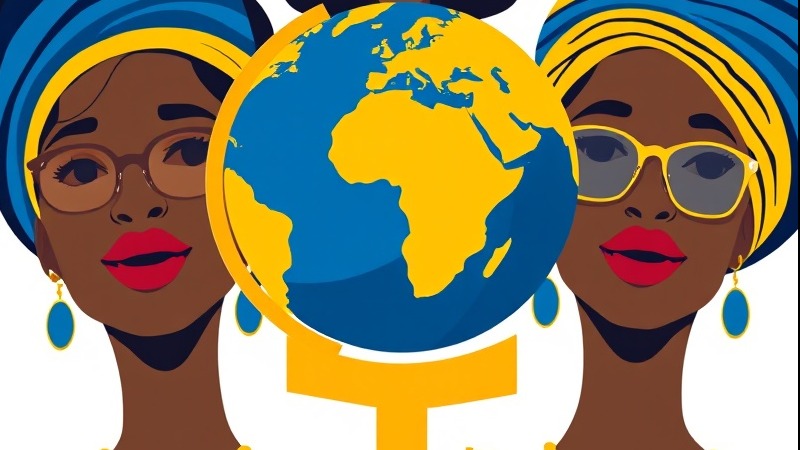Did you know: African women are starting businesses at a higher rate than anywhere else on earth, yet face some of the world’s toughest gender barriers. Now, artificial intelligence is poised to rewrite that story—empowering businesswomen to lead Africa’s digital future and break through old stereotypes.
Revealing the AI Impact on African Businesswomen: How Artificial Intelligence Is Changing the Game
- Discover how the AI impact on African businesswomen challenges stereotypes, levels the professional playing field, and paves the road to gender equality in Africa.
The AI impact on African businesswomen is profound and rapidly reshaping the business landscape across the continent. Despite historical challenges—including patriarchal structures, limited access to capital, and cultural restrictions—African women are not just joining the AI revolution; they are driving it. Today, the infusion of artificial intelligence into key markets like fintech, agriculture, e-commerce, and healthcare is creating income-generating opportunities that previously seemed out of reach. Unlike traditional business models that often reinforce bias, AI-powered systems can challenge discriminatory practices by spotlighting merit and innovation. Now, ambitious businesswomen in Nigeria, Kenya, South Africa, and beyond are leveraging AI models for targeted market insights, customer engagement, and optimized operations. These systemic shifts are reducing traditional barriers and enabling women and girls to participate more equitably in the African economy.
But the story goes deeper than opportunity. The AI industry is catalyzing a crucial culture shift by celebrating diverse leadership and expertise, particularly among young African women who are now leading digital transformation projects across the continent. By promoting gender equality through inclusive AI development and ethical concerns around bias in AI, these pioneers are inspiring a new generation of leaders and setting powerful examples for how AI can be harnessed for collective good. The result? AI is not just changing individual businesses—it’s helping reimagine the very ecosystem of African entrepreneurship, opening doors for future generations of talented women.

Exploring AI's Potential: African Women Lead Innovation and Change
Artificial Intelligence Empowerment: Stories from African Businesswomen
"African women embracing artificial intelligence are not just adapting—they are leading Africa’s digital future."
Across the African continent, the rise of ai innovation is intertwined with powerful personal stories of determination and resourcefulness. Female entrepreneurs in countries like Rwanda and Ghana are breaking from the norm, using advanced AI systems to create jobs, streamline logistics, and manage supply chains more efficiently. These stories highlight more than business success—they represent a shift in lived experiences, as women adapt AI models to suit the African context, tailoring solutions to local markets and needs. For example, one Nairobi-based fintech founder leveraged AI algorithms to develop micro-loans for women who lacked access to traditional banks; with the power of data-driven insights, she now runs one of the fastest-growing startups in East Africa.
The empowerment goes beyond innovation. By navigating funding hurdles, technical training gaps, and cultural resistance, African women in business are setting new industry standards and serving as role models. As these trailblazers foster inclusive AI cultures within their organizations, they pave the way for expanded mentorship programs and collaboration networks that ensure women and girls are integral to Africa’s digital transformation. Their efforts signal a broader movement—one where artificial intelligence helps dismantle barriers rather than reinforce them.
Data Governance: Harnessing Data for Smarter, Fairer AI Solutions
- Importance of data governance for African women in business, practical strategies for safe and impactful AI development.
Central to AI’s impact on African businesswomen is the issue of data governance . For AI development to truly serve the needs of women entrepreneurs, it must be built on robust data collection and management practices that recognize and mitigate hidden biases. In regions such as South Africa and Nigeria, forward-thinking business leaders are demanding greater transparency in training data, insisting that AI models are reflective of the diversity found across the African continent.
Practical strategies include creating platforms for ethical data sharing and promoting gender-balanced representation in data science teams. By prioritizing inclusive AI and establishing data policies rooted in equity, these initiatives help address historical data gaps and prevent the perpetuation of stereotypes. Organizations and startups led by African women are increasingly championing these approaches, ensuring that AI systems produce fairer outcomes and expand access to high-impact economic opportunities for all. True empowerment comes when women shape not only their destinies but also the algorithms and policies that drive Africa’s digital future.

Gender Bias in AI: Overcoming Barriers in the AI Impact on African Businesswomen
Understanding Gender Bias and Bias in AI: Challenges Facing African Women Entrepreneurs
Bias in AI remains a formidable obstacle for African businesswomen striving for equity in the digital economy. When AI algorithms are trained on non-inclusive or flawed data, gender bias in AI systems can lead to the reinforcement of societal stereotypes, discriminatory lending practices, or uneven access to finance and resources. This is not a distant or theoretical concern; in many cases, automated systems in e-commerce or HR have mirrored the very patriarchal structures that have long hindered progress for African women. Such ethical concerns have come under scrutiny from organizations like the African Union, the Economic Commission for Africa, and numerous human rights groups.
To address these issues, it is critical that African women are present at every stage of AI development, from data collection through to deployment. By lending their experiences, advocating for more inclusive training data, and leading key projects, they can help steer the AI industry toward greater fairness and transparency. Not only does this approach prevent existing inequalities from being further entrenched, but it also offers a roadmap for other regions seeking ethical, people-centered AI ecosystems that reflect real lived experiences across gender and culture.
Case Study: How South Africa Tackles Gender Bias in Artificial Intelligence
South Africa is emerging as a hub for addressing gender bias in AI and pioneering solutions that prioritize gender equality in the digital space. Policy reforms encouraged by both governmental agencies and the private sector have set a precedent: gender-balanced AI development teams, ethics committees with strong female representation, and sector-specific guidelines for algorithm transparency. Recently, collaborative projects between South African universities and leading tech firms have championed clear frameworks for auditing AI systems to root out gender bias—these efforts have been lauded by the Commission for Africa and the Economic Commission for Africa. Beyond policy, South African AI innovators are offering mentorship opportunities to young African women, actively shaping the next generation of technical leaders.
This commitment to inclusive AI is not without its challenges, but continued investment in audits, legal protections, and targeted education programs points the way forward for the continent. As more countries adopt similar strategies, the collective impact of these efforts radiates throughout the African AI industry, building a more just and sustainable ecosystem.
| Region | AI-Driven Opportunities | Gender Bias Impact |
|---|---|---|
| West Africa | Fintech innovation, digital marketplaces, AI-driven healthcare | Persistent bias in lending algorithms, limited access to STEM education |
| East Africa | Agri-tech, AI-powered logistics, mobile banking | Cultural barriers in AI jobs, underrepresentation in leadership |
| Southern Africa | AI ethics research, policy reform, public-private partnerships | Historical data biases, slow pace of AI upskilling for women |
| North Africa | Health diagnostics, smart cities, AI-driven e-commerce | Language model bias, gendered digital divide |
Gender Equality and Sustainable Development: The Dual Role of AI Impact on African Businesswomen
AI Innovation for Sustainable Development: Success Stories from Across Africa
- Examples of AI innovation empowering African women in agriculture, healthcare, and fintech.
The intersection of gender equality and sustainable development is vividly illustrated by AI-driven initiatives led by African women. In Kenya, female agripreneurs utilize machine learning and smart sensors to optimize irrigation and crop yields—redefining food security for their communities. Meanwhile, in Nigeria, women-led startups in the health tech sector employ AI systems to provide early cancer screenings, improving outcomes for women and girls in underserved rural areas. In South Africa, the fintech revolution sees businesswomen leveraging AI models to extend micro-credit and innovative payment technologies to female traders, accelerating economic growth and closing the gender gap in access to capital.
These projects underscore the transformative power of inclusive AI, especially when driven by women who understand both the challenges and opportunities within their communities. By addressing issues like climate change, health disparities, and financial exclusion, these AI-powered solutions contribute not only to sustainable development goals but also empower thousands of women to become engines of change. The ripple effect of these innovations is seen in job creation, community advancement, and the growing confidence of African women to define the future of their economies.

The Influence of Language Models: Addressing Cultural Nuances and Barriers
Language models in AI—systems designed to understand and generate human language—carry substantial weight in bridging cultural gaps and making technology accessible to diverse African populations. For many African businesswomen, the ability to interact with AI in local languages and dialects makes digital tools more approachable and useful. However, AI models must be trained on a broad set of cultural references to avoid perpetuating bias or misunderstanding sensitive traditions.
Women leaders are playing a key role here, working with international AI developers to enhance language data sets, prioritize indigenous language support, and incorporate the lived experiences of women into the design of AI systems. This is critical not only for business productivity but also for inclusion and representation. By tackling these challenges head-on, African women ensure that language models foster a truly inclusive AI ecosystem that respects Africa’s linguistic and cultural richness.

The Future of AI Development: What’s Next for African Women in Business?
Predictions: Growing Trends in AI Impact on African Businesswomen
Looking ahead, the AI impact on African businesswomen is set to drive even deeper transformation as investment, policy, and education align to unlock digital potential. Emerging trends include the increasing deployment of AI for social entrepreneurship, predictive analytics for market expansion, and the expansion of tailored AI skills bootcamps for young women. Furthermore, organizations such as the African Union and the Economic Commission for Africa are developing continent-wide strategies for gender-responsive AI systems, ensuring both ethical standards and real-world impact. As these trends gain momentum, expect to see more African women rise as influential voices in AI ecosystem governance, shaping the continent’s future from the grassroots to global innovation forums.
With these shifts, there is a growing recognition that data-driven decision-making, inclusive development, and localized solutions will be key to unlocking the next wave of prosperity—and at its heart will be African women, setting the standard for responsible AI leadership and sustainable business growth.
Key Skills for African Women Navigating AI Innovation
- Digital literacy
- Data science
- Ethical leadership
- Networking
- Technological adaptability
These skills are rapidly becoming non-negotiable for African businesswomen aspiring to excel in the AI-driven economy. Digital literacy opens the door to understanding core concepts like AI algorithms and machine learning, while data science expertise unlocks deeper insights for business decisions. Ethical leadership ensures inclusivity in team building and AI development, and active networking helps bridge the gender gap by building supportive professional circles. Technological adaptability—embracing new platforms quickly—is perhaps the strongest lever for keeping pace in an industry characterized by continuous change.

FAQ: Common Questions About the AI Impact on African Businesswomen
How does artificial intelligence support African women entrepreneurs?
Answer: Artificial intelligence empowers African women by automating processes, providing market insights, and facilitating global connections, thus helping overcome traditional barriers to entry.
What are the main risks of gender bias in AI for African businesswomen?
Answer: Gender bias in AI can reinforce existing inequalities if not addressed through inclusive data governance and diversified AI development teams.
Is the AI impact on African businesswomen more positive or negative?
Answer: Overall, the AI impact is positive, with growing opportunities in innovation, entrepreneurship, and gender equality—provided persistent challenges like bias and access are continuously addressed.
PAA: How can African businesswomen leverage artificial intelligence for growth?
African businesswomen can adopt AI-driven tools for market research, customer engagement, and operational efficiency. Mentorship programs and training in AI literacy also bridge the digital skills gap.
PAA: What are the key challenges African women face in AI adoption?
Key challenges include limited access to technology, persistent gender and cultural biases, funding gaps, and technical training barriers.
PAA: Which sectors have the greatest AI impact on African businesswomen?
AI is revolutionizing sectors like agri-tech, fintech, healthcare, and e-commerce, where efficiency and innovation can directly boost women-led businesses.
Highlighting the journeys, challenges, and successes of three leading African women in AI, with interviews and real-world applications.
Shaping the Next Decade: AI Impact on African Businesswomen and the Road Ahead
"The true AI impact on African businesswomen will be measured by the sustainable and inclusive opportunities we create for generations to come."
The coming decade belongs to the bold—African businesswomen ready to wield the transformative power of AI. By championing inclusive AI development, amplifying their voices, and mentoring the next generation, these leaders will ensure the AI revolution is truly African, deeply equitable, and endlessly inspiring.
Take the Next Step: Empowering Yourself Through AI
Now is the time for African businesswomen to invest in digital skills, embrace inclusive innovation, and connect with supportive networks shaping tomorrow’s AI-driven Africa. Become the change-maker your community—and the continent—needs.
Artificial intelligence (AI) is profoundly transforming the landscape for African businesswomen, offering both unprecedented opportunities and notable challenges. Organizations like Women in Tech Africa are at the forefront, focusing on expanding entrepreneurship and increasing the number of women in technology across the continent. With chapters in multiple countries, they provide a supportive network for aspiring female tech entrepreneurs. ( en.wikipedia.org )
However, the integration of AI also presents challenges. A report presented at the Global AI Summit for Africa in Kigali, Rwanda, highlighted that tasks performed by women in Africa’s outsourcing sector are, on average, 10% more susceptible to automation than those by men. This disparity could exacerbate gender-based inequalities if not proactively addressed. ( apnews.com )
To navigate these challenges, initiatives like Tech Herfrica are working to bridge the digital divide by focusing on the digital and financial inclusion of women and girls in rural areas of Africa. By supporting the development of women-led businesses through technology, they aim to empower women to thrive in the digital economy. ( en.wikipedia.org )
In summary, while AI offers transformative potential for African businesswomen, it is crucial to address the accompanying challenges through inclusive policies, targeted training, and supportive networks to ensure equitable benefits across the continent.
 Add Row
Add Row  Add
Add 





 Add Row
Add Row  Add
Add 

Write A Comment